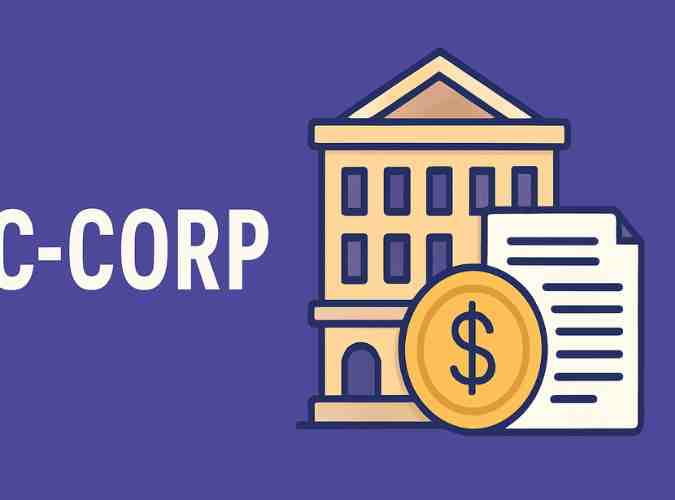Launching a startup in the United States as a foreign founder comes with many decisions – one of the earliest and most important is selecting the right legal entity for your company. The choice between a Limited Liability Company (LLC), C-Corporation (C-Corp), or S-Corporation (S-Corp) will have significant financial and tax implications. This decision can affect how your startup is taxed, how easily you can raise capital, and what compliance obligations you’ll face. In this article, we’ll explore which entity is best from a financial and tax standpoint, especially for non-U.S. entrepreneurs, and how considerations may change from the early startup stage to the growth phase. We’ll also explain why S-Corps are generally not suitable for foreign founders, highlight the advantages of a Delaware C-Corp for fundraising and expansion, discuss key tax issues like double taxation vs. pass-through treatment, and show how ERB can partner with you in setting up and running your U.S. business.
Overview of U.S. Business Entity Options
LLC, C-Corp, or S-Corp? All three structures can provide limited liability protection (meaning your personal assets are protected from business debts), but they differ in ownership rules, taxation, and suitability for high-growth startups. Here’s a quick overview:
Lorem ipsum dolor sit amet, consectetur adipiscing elit. Ut elit tellus, luctus nec ullamcorper mattis, pulvinar dapibus leo.
LLC (Limited Liability Company)

A versatile entity that has less formalities. By default, an LLC’s profits pass through to the personal taxes of the owners (the LLC itself generally does not pay income tax). There is no limit on the number of members, and who can own an LLC – foreign individuals and foreign companies can be members. Management and structure is flexible according to the operating agreement.
C-Corp (C Corporation)

A C-Corp is a more formal corporate structure that is a separate taxable entity. C-Corps pay corporate income tax on profit, and then if they distribute that profit to shareholders as dividends, shareholders tax that income again (classic “double tax”). A C-Corps can have unlimited shareholders (including foreign owners) and multiple classes of stock. This is the normal structure for larger companies and venture-funded startups.
S-Corp (S Corporation)

S-Corps have significant restrictions; they cannot have more than 100 shareholders and can only have one class of stock, and shareholders need to ALL be citizens or residents of the United States. The last requirement effectively excludes non-resident foreign-founders from being shareholders, and in a practical sense makes S-Corp status unavailability for most foreign-owned startup ventures.
C-Corporation – The Investor-Friendly Path to Growth
The C-Corporation is the de facto choice for the majority of U.S. startups that intend to scale, especially those seeking venture capital or planning significant growth. From a financial and tax standpoint, C-Corps have different trade-offs than LLCs:
- Double Taxation (and Why It’s Not Always a Deal-Breaker): A C-Corp is a separate tax-paying entity. It pays U.S. corporate income tax on its profits (21% federal tax rate, plus any applicable state corporate taxes). If the company distributes profits to shareholders as dividends, those dividends are taxed again on the shareholders’ personal tax returns (and for foreign shareholders, U.S. tax law requires withholding on dividends, typically 30% or a lower treaty rate). This double taxation is often cited as a disadvantage of C-Corps. However, in the context of a high-growth startup, it’s less concerning for a few reasons: Startups rarely pay dividends in early years, if ever, because they reinvest earnings into growth.
- Welcoming Foreign Owners: Unlike an S-Corp, a C-Corp imposes no restrictions on foreign ownership. You as a foreign founder can own 100% of a C-Corporation. You can also have co-founders or investors from any country. The C-Corp structure cleanly separates the company’s finances from your personal taxes. You won’t need to file a U.S. personal tax return just for being a shareholder (you would only have a U.S. filing obligation if you draw a salary from the company’s U.S. operations or receive dividends or other U.S.-sourced income).
- Ease of Raising Capital: From a financial standpoint, the biggest reason startups choose C-Corps is to facilitate fundraising and growth.
- Stock Options and Employee Incentives: High-growth startups often use stock options or equity grants to attract talent. A C-Corp is well-suited for this – you can set up a stock option pool and grant options that convert into shares of stock.
- Formality and Compliance: C-Corps do come with more formal requirements. You’ll need to appoint a Board of Directors, issue shares, hold annual board and shareholder meetings (even if on paper), and file annual reports with the state. There are also more extensive accounting and tax filing duties (a corporate tax return each year, for instance). These requirements do mean slightly higher administrative overhead compared to an LLC, but with good guidance (legal counsel and financial services), these obligations are very manageable.
- In essence, a C-Corp is usually the best choice for startups aiming for significant growth, fundraising, and international expansion. It creates a clear separation for tax purposes, allows you to bring in any number and nationality of investors, and positions your company to issue stock and even go public someday. The majority of U.S. tech startups – especially those founded by non-U.S. residents – ultimately choose the C-Corp route to maximize their financial and strategic flexibility.
The Delaware C-Corp Advantage for Fundraising and Expansion
If a C-Corporation is the right path, the next question is often “Which state should I incorporate in?” For startups with big ambitions, the answer is almost always Delaware. Delaware is famous for being the startup and corporate capital of the U.S., and it offers specific advantages that are especially relevant for foreign-founded companies:
- Investor Preference: Delaware C-Corps are considered the “gold standard” by U.S. investors. Virtually all venture capitalists and sophisticated investors are most comfortable investing in a Delaware-incorporated company. Delaware’s corporate laws are well-understood and time-tested, which means the legal documents for investments (like stock purchase agreements, investor rights agreements, etc.) are typically based on Delaware law.
- Easy Issuance of Stock: Delaware allows corporations to authorize large numbers of shares and create different classes of stock easily.
- Favorable, Predictable Legal Environment: Delaware has a dedicated Court of Chancery and a vast body of corporate case law. This means any corporate legal disputes (should they ever arise) are handled by expert judges with speed and consistency.
- Tax Considerations and Multi-State Operations: Delaware’s tax setup is friendly to companies that are headquartered elsewhere. If your Delaware corporation does not actually conduct business in Delaware (e.g., your operations are in California or you’re based abroad selling into the U.S.), Delaware will not impose state income tax on your company. (You will, however, pay taxes in the states where you do have business activity, and you’ll owe Delaware an annual franchise tax fee for the privilege of incorporation. The franchise tax for a small startup is usually quite modest – often a few hundred dollars a year – and can be calculated in different ways to keep it low while the company is early-stage.)
- Ease of Incorporation and Maintenance: Delaware makes it very easy for anyone (U.S. or foreign) to form a company. You don’t need to be present in Delaware or even the U.S. – filings can be done online or via agents within a day or two. Delaware allows a corporation to be formed with a single person as the sole director and all officers, which simplifies things if you’re a solo founder. You are required to have a registered agent with an address in Delaware (which is a service many firms provide for a low annual fee). This agent handles official mail and filings. For a foreign founder, having a Delaware company means you don’t need to physically be in any particular state to maintain it – you can manage everything remotely with the help of your registered agent and digital tools.
- International Credibility and Expansion: Delaware corporations are well-recognized not just in the U.S. but worldwide. If your strategy involves expanding into other countries, setting up international subsidiaries, or engaging in cross-border partnerships, having a Delaware Inc. as your parent company can be advantageous.
Key Tax Considerations for Foreign-Owned Startups
Choosing between an LLC and a C-Corp fundamentally affects how your startup’s income is taxed. Here are the key tax concepts to understand, with an eye on what they mean for foreign founders:
- Corporate Tax vs. Pass-Through Tax: As discussed, C-Corps pay corporate income tax on their profits, whereas LLCs (and S-Corps) are pass-through entities that shift the tax to the owners. For a foreign founder, a pass-through (LLC) means any U.S. source business income will likely require you to file a U.S. tax return and pay tax on that income personally. In contrast, a C-Corp would pay tax itself, and you as a foreign shareholder might only deal with U.S. tax if you receive dividends or salary. This can make the C-Corp more attractive if you prefer to avoid personal U.S. filing obligations.
- Double Taxation Details: If your C-Corp does become profitable and you wish to distribute dividends to yourself or other shareholders, those dividends will be subject to U.S. withholding tax for foreign owners. The default withholding rate is 30%, though tax treaties with your country might reduce that rate (for example, many treaties lower it to 15% or even 5% for certain owners).
- State Taxes and Annual Fees: Beyond federal tax, consider state-level taxes:
- Franchise Taxes: Many states charge an annual franchise tax or fee for the privilege of doing business or having an entity there. Delaware’s franchise tax for corporations is well-known (and ranges based on your shares and assets, but there are startup-friendly calculation methods). LLCs in Delaware also pay an annual LLC franchise tax (typically a flat fee around $300). Other states have their own charges – for example, California has an $800 minimum annual tax for both LLCs and corporations doing business there, plus an additional fee for LLCs if their revenue is high, and a corporate income tax for C-Corps of 8.84%. Texas has a franchise tax based on revenue (but no personal income tax), Florida has a modest corporate tax but no personal tax, etc. It’s important to budget for these state costs. They are usually not prohibitive, but they add up.
- Operating in Multiple States: If your startup will have a presence in several states (or sell products/services into various states), tax compliance can become complex. You may have “nexus” in states requiring you to file tax returns there. For an online business with customers across the U.S. but no physical presence, you might only worry about sales taxes (if selling goods) rather than income tax in each state. A conversation with a U.S. tax advisor can clarify your specific exposure. Most foreign founders start with incorporating in Delaware and then registering in the one or two key states where they hire employees or open an office. That keeps things manageable.
- Franchise Taxes: Many states charge an annual franchise tax or fee for the privilege of doing business or having an entity there. Delaware’s franchise tax for corporations is well-known (and ranges based on your shares and assets, but there are startup-friendly calculation methods). LLCs in Delaware also pay an annual LLC franchise tax (typically a flat fee around $300). Other states have their own charges – for example, California has an $800 minimum annual tax for both LLCs and corporations doing business there, plus an additional fee for LLCs if their revenue is high, and a corporate income tax for C-Corps of 8.84%. Texas has a franchise tax based on revenue (but no personal income tax), Florida has a modest corporate tax but no personal tax, etc. It’s important to budget for these state costs. They are usually not prohibitive, but they add up.
- Foreign Tax Credit and Treaties: As a foreign founder, you should also evaluate how U.S. taxes interplay with your home country’s tax system. Many countries tax their residents on worldwide income, which means if you pay tax in the U.S. on your company’s income (whether via pass-through or on salary/dividends), you might also owe tax on that same income at home. Tax treaties often provide relief to avoid double taxation – usually by letting you credit the U.S. tax paid against your home country tax liability. The structure you choose can affect how income is characterized and taxed back home.
- Bottom line on taxes: The LLC vs. C-Corp decision will influence whether you’re taxed now or later, once or twice, and how much paperwork is involved. An LLC can be tax-efficient if you want immediate flow-through of losses or profits, but it puts the compliance burden on you personally. A C-Corp may mean some taxes at the corporate level, but it defers personal taxation until you choose to take income and can shield you from direct filing requirements in the meantime.
Partnering with ERB: Your Financial Services Ally in the U.S.
Navigating the financial and tax landscape of a U.S. startup can be challenging – especially when you’re doing it from abroad. This is where ERB (Emerging Risk Brokers) comes in as a dedicated financial services partner for foreign founders entering the U.S. market. With over 27 years of experience supporting multinational startups, ERB provides end-to-end guidance and support so you can focus on building your business. Here’s how ERB can help you choose and operate the right structure for your U.S. startup:
- Entity Selection and Incorporation: Not sure whether to set up an LLC or a C-Corp (or which state to choose)? ERB’s experts will assess your startup’s goals and circumstances to help determine the optimal legal entity from a financial perspective.
- Opening U.S. Bank Accounts: One hurdle foreign founders face is opening a U.S. business bank account without U.S. residency. ERB has established relationships and know-how to assist in opening U.S. bank accounts for your new company.
- Payroll Setup: If you plan to hire U.S. employees or even pay yourself a salary through the company, ERB can set up and manage payroll for your startup. We ensure all federal and state payroll taxes are properly handled, and that you have the right systems to pay your team on time.
- Ongoing Accounting, Bookkeeping, and Tax Filing: As your company grows, so do the bookkeeping and reporting requirements. ERB offers outsourced CFO services, accounting, and bookkeeping support specialized for startups.
- CFO Advisory and Financial Strategy: Beyond day-to-day bookkeeping, ERB can act as your fractional CFO, providing strategic financial advice.
- Choosing the right entity and managing U.S. finances doesn’t have to be daunting. With ERB’s comprehensive support, you gain a partner who will guide you through incorporation, set up your financial infrastructure, and stay with you for ongoing support as your U.S. startup grows.
